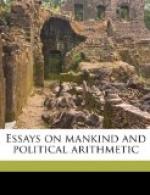Our study now ought to be how those debts may be speedily cleared off, for which these new revenues are the funds, that trade may again move freely as it did heretofore, without such a heavy clog; but this point we shall more amply handle when we come to speak of our payments to the public.
Mr. King divides the whole body of the people into two principal classes, viz.:-
Increasing the wealth of the kingdom 2,675,520 heads.
Decreasing the wealth of the kingdom 2,825,000 heads.
By which he means that the first class of the people from land, arts, and industry maintain themselves, and add every year something to the nation’s general stock, and besides this, out of their superfluity, contribute every year so much to the maintenance of others.
That of the second class some partly maintain themselves by labour (as the heads of the cottage families), but that the rest, as most of the wives and children of these, sick and impotent people, idle beggars and vagrants, are nourished at the cost of others, and are a yearly burden to the public, consuming annually so much as would be otherwise added to the nation’s general stock.
The bodies of men are, without doubt, the most valuable treasure of a country, and in their sphere the ordinary people are as serviceable to the commonwealth as the rich if they are employed in honest labour and useful arts, and such being more in number do more contribute to increase the nation’s wealth than the higher rank.
But a country may be populous and yet poor (as were the ancient Gauls and Scythians), so that numbers, unless they are well employed, make the body politic big but unwieldy, strong but unactive, as to any uses of good government.
Theirs is a wrong opinion who think all mouths profit a country that consume its produce, and it may be more truly affirmed, that he who does not some way serve the commonwealth, either by being employed or by employing others, is not only a useless, but a hurtful member to it.
As it is charity, and what we indeed owe to human kind, to make provision for the aged, the lame, the sick, blind, and impotent, so it is a justice we owe to the commonwealth not to suffer such as have health, and who might maintain themselves, to be drones and live upon the labour of others.
The bulk of such as are a burden to the public consists in the cottagers and paupers, beggars in great cities and towns, and vagrants.
Upon a survey of the hearth books, made in Michaelmas, 1685, it was found that of the 1,300,000 houses in the whole kingdom, those of one chimney amounted to 554,631, but some of these having land about them, in all our calculations, we have computed the cottagers but at 500,000 families; but of these, a large number may get their own livelihood, and are no charge to the parish, for which reason Mr. King very judiciously computes his cottagers and paupers, decreasing the wealth of the nation but at 400,000 families, in which account he includes the poor-houses in cities, towns, and villages, besides which he reckons 30,000 vagrants, and all these together to make up 1,330,000 heads.




